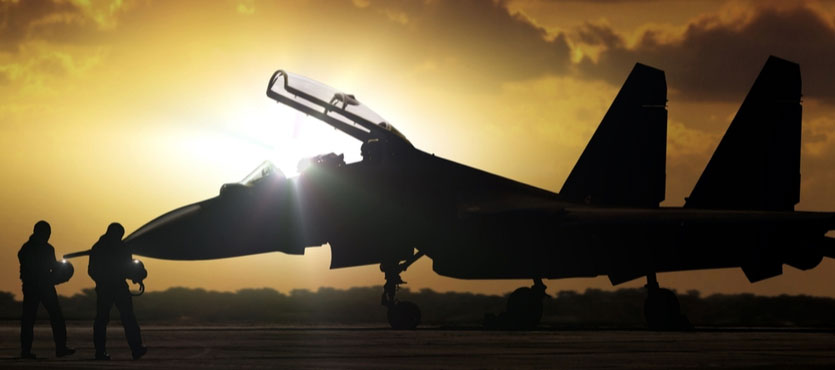One enterprising company is taking advantage of an expected uptick in business even as contractors leave Iraq and other active war zones.
When Adversary Air founder and CEO Jeffrey Parker began the company in 1994, it had a few old F-21 Kfirs, MK-58 Hawker Hunters and L-39 Albatross to challenge sophisticated F-18 Hornets in training missions. Business was slow at first because the Air Force kept most of these exercises in-house. Now, the Air Force is dealing with an ongoing shortage of pilots and squadron downsizing. As planes and pilots became more precious, contractors like Adversary Air sensed an opening.
Mr. Parker recently doubled down with the purchase of 63 French Mirage fighters. He plans to upgrade them so they are worthy aerial opponents for the F-18. The Mirage is a “great airplane” that is “very upgradable. The aerodynamics of it are better than anything we have right here. They are not fourth-gen aerodynamically, but we are putting fourth-gen avionics in them to make them very capable. The aircraft will be relevant. They will be very good training platforms,” he noted. To make these upgrades and improvements possible, the purchase included 150 spare engines and lots of spare parts.
In 2017, Air Combat Command chief Gen. Mike Holmes remarked that outsourcing was only a temporary solution. Mr. Parker does not see it that way. He expects Adversary Air to double in size in the next three years. “Long-term solutions are needed to try and handle everything they are accustomed to doing internally,” he predicted.
“We do have a high degree of confidence that not only we, also our friends in the industry, will have plenty of business between the Navy and the Air Force,” Mr. Parker concluded. His company expects to expand operations in several states as well as some foreign countries.
Yesterday’s Trainers and Advisers
Training and assisting foreign fighters has always been a controversial mission. American policymakers usually want to bolster the capabilities of allied forces. Sometimes the “advisers and trainers” take a more active role. They sometimes lead by example and participate in combat missions. Military brass then must go before a skeptical press and explain these casualties.
Moreover, the tactics that work well stateside may not go over well in other cultures. Tough drill sergeants from John Wayne (1949’s Sands of Iwo Jima) to R. Lee Ermey (1987’s Full Metal Jacket) to Jamie Foxx (2005’s Jarhead) have prepared generations of men. But their approaches would probably not play too well in predominantly Muslim countries, like Kuwait and Qatar, whose citizens do not particularly like Americans to begin with.
Today’s Trainers and Advisers
Contractors provide both deniability and flexibility, so they solve both these pressing problems.
Private contractors, whether they are trainers or not, do not count in the official troop statistics. So, deploying contractors makes troop levels appear lower. That usually plays well before the aforementioned skeptical press. Foreign politicians like contractors, as well. They can honestly tell their constituents that only a few American soldiers are in the Motherland.
Contractors are flexible. If the government needs to help train some new recruits in a foreign country, they need only make one call to a contractor. That is much easier than going through duty rosters and finding a qualified person. Later, when basic training is over, the contractors go home. The Army has no more financial obligations in the matter.
Furthermore, a contractor often has a unique skill set that a regular servicemember lacks. That could be language skills, experience with a particular type of person, or experience with a particular type of weapon.
Beyond Advice and Training
These individuals often handle the pre-combat chores. Once the combat ends, there are plenty of other things to be done, and overseas contractors fill a vital role in all of them.
After a particularly destructive conflict, like the ongoing Syrian civil war, rebuilding costs may be almost as high as the war itself. Observers now estimate that these costs will eclipse $1 trillion, and the projected price tag keeps going up. Many American construction firms will bid for these projects and send contractors overseas to work for various government agencies. Additionally, there is still a need for armed contractors even though the bullets are no longer flying as fast. In some cases, the protective security force may be almost as large as the workforce.
Compensation Available
Whatever phase of combat or non-combat they are in, the Defense Base Act provides compensation to injured overseas contractors.
In terms of benefits, the DBA pays for lost wages. The lost wage benefit gives contractors and their families a steady income stream as they recover. In the alternative, if they are permanently disabled, the lost wage benefit may provide long-term income.
The DBA also directly pays for most all reasonably necessary medical expenses. So, recovering contractors have the financial resources they need to get back to work. At the end of the day, that is what everybody wants. In addition to emergency care, the DBA also pays for physical rehabilitation and follow-up medical care. Benefits are even available for transportation and other ancillary costs, even including service dogs if medically prescribed.
Strict time deadlines apply in these cases. In some situations, the statute of limitations is only one year. So, attorneys have very little time to accumulate the evidence they need to build a case, collect necessary medical records, and prepare convincing legal arguments. The sooner you call, the better your case for compensation will be.
Contact Barnett, Lerner, Karsen & Frankel, P.A. to learn more about Defense Base Act procedures.

